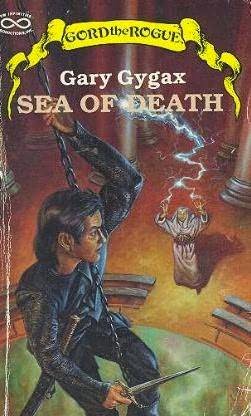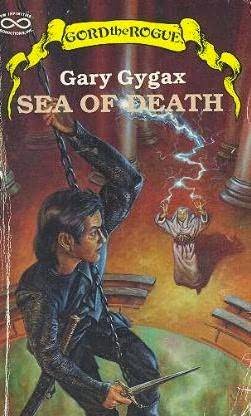(Caution: Spoilers)
No, I haven’t forgotten my reviews of various Greyhawk novels. When last we left, I had just reviewed Artifact of Evil, the second in Gary Gygax’s “Gord the Rogue” series of books, published right before he left TSR. Now we turn to the first in the series to be published after his departure (and the first to actually bear the “Gord the Rogue” banner as a series identifier), Sea of Death.
Published by New Infinities in 1987, this novel picks up some months after the previous installment, and finds Gord in the Baklunish lands west of the Flanaess. He is on a mission to recover the second part of the three-part artifact known as the Theorpart, which will free the god Tharizdun from his aeons-long sleep and bring about the final victory of Evil over the multiverse. To assist him in this mission, he has been endowed with magical powers by the Demiurge (Basiliv, who in Gygax’s Greyhawk is the Mage of the Valley), and the Cat Lord, who favors the forces of Neutrality.
The second part of the artifact, known as the Second Key, is found in the City Out of Mind in the dangerous Sea of Dust. The map in the beginning of the book confirms that this is the same as the Forgotten City on the original Darlene map of the World of Greyhawk.
One of the things I like about this novel is that we see a lot of the inner workings of the various evil factions. Iuz finds himself under the thumb of his mother Iggwilv and his ally Zuggtmoy, while at the same time opposing his father Grazz’t, who is in turn opposed by various other princes of the Abyss. They, being chaotic, oppose the release of Tharizdun, but wish the power of the various keys that will free him for themselves. Against all of these chaotic evil factions is Anthraxus, leader of the neutral evil plane of Hades, who is working to see Tharizdun released, feeling he will be given a high place in the new order of evil. It’s clear in these passages that Iuz is a favorite character of Gygax’s, and he gives some wonderful dialogue to the cambion.
And opposing all those still are the forces of Neutrality (of which Gord is a highly-placed champion), and we get some inkling that Good is also involved, but appearances by angels and solars are few.
Iuz and Grazz’t are contesting for the Second Key by sending a single agent with some assistants; the evil dwarf Obmi (from the previous book, as well as appearances in Hall of the Fire Giant King and the original Castle Greyhawk) on behalf of Iuz/Iggwilv/Zuggtmoy, and the drow priestess Eclavdra (also from Hall of the Fire Giant King, as well as Vault of the Drow) on behalf of Grazz’t. To befuddle their enemies, Grazz’t and his right-hand-demon Vuron (one of the most fascinating characters in the series; more about him later) have created a clone of Eclavdra, who will act as a decoy.
Of course, things don’t go according to anyone’s plan. The clone of Eclavdra survives, although she doesn’t remember being Eclavdra, and is known as Leeda, Gord’s love interest. They proceed to the buried city with trusted Baklunish tribesmen, and all three groups converge on the resting place of the artifact at the same time (which is actually lampshaded in the book, with one of the characters saying something about such synchronicities being arranged by mysterious forces).
In the city, they encounter albino pygmies, the degenerate descendants of the Suel who did not flee the city when calamity struck down the Suel Imperium centuries earlier, who are served by vicious albino apes. They have many captives from the surface, and we learn that there is some trade between the underworld of the drow and this place; Leda’s memories slowly resurface as she continues on with Gord (and her character becomes more like that of the true Eclavdra).
Eventually, Gord prevails over the perils of the city, and a cadre of slaves is rescued. The desert is once again crossed, and on the shores of Jerlea Bay a huge battle is fought not only between the three agents, but also the extra-planar assistance they invoke. Leda slays Eclavdra, the forces of Good intervene, and eventually the magical powers involved hurl most of the combatants into other planes.
At the very end, Vuron convinces Gord to hand over the Second Key to him, along with Leeda, who will serve in the role of Eclavdra, to temper the actions of his lord, Grazz’t. This is an instance of the odd nature of Vuron, who is as alabaster-white as his master is ebon-black, and who displays a decidedly lawful streak for a demon lord. He might even be said to suffer from pangs of Good, and the scenes were he puts his intellect on display are wonderfully done.
From a gaming standpoint, there is a ton of material that could be used in a campaign. Details large and small abound about the Baklunish tribes north of the Sea of Dust, there are enough pieces of information about the flora and fauna. weather, and environment of the Sea itself to run an adventure or three within it, and tantalizing hints about some of the lands west and south as well (some nations are named, which I used in my own “Beyond the Flanaess” maps several years ago). The City Out of Mind/Forgotten City is described in relative detail; certainly enough that an enterprising DM could use the chapters set there as the basis for a fully fleshed-out adventure.
This is the point in the series where Gord becomes more of a Mary Sue, however. Imbued with magical powers by various powerful beings, this novel sets him on the road to near-unstoppability, and the resultant increase of the power level of his enemies means that his companions (Curley Greenleaf, Gellor, and Chert) become more sidelined. Personally, I find that hurts the stories themselves, and therefore I give this novel three wizards out of five. Still recommended, especially if you’re looking for a source of inspiration and information on the places visited, but not required reading.














The change of publishers to New Infinities also marked a very sharp tonal shift in the writing itself.
The rich, varied and profane dialogue (the best aspect of the first two books from a pure writing standpoint, imo…and predating the "realistic" speech of GRRM's bloated fantasy by many years) is gone, and the overall tone of EGG's prose becomes more generic epic fantasy. The story in this book is all right, though, and is decently paced, but the series went downhill from here.
Gord very much becomes a Mary Sue starting here, and maybe that's responsible for the shift in the writing. Saga is still one of my favorite fantasy books; loose and episodic, it feels like the old f/s-f "novels" of the '50s through the '70s that were really republished short stories and novellas collected under a single cover, but with a very contemporary feel. The street-eye view of life in that book was something of an eye-opener to a young me, as I'd never encountered anything quite like it in a fantasy novel. And that is lost in Sea of Death.
The change of publishers to New Infinities also marked a very sharp tonal shift in the writing itself.
The rich, varied and profane dialogue (the best aspect of the first two books from a pure writing standpoint, imo…and predating the "realistic" speech of GRRM's bloated fantasy by many years) is gone, and the overall tone of EGG's prose becomes more generic epic fantasy. The story in this book is all right, though, and is decently paced, but the series went downhill from here.
Gord very much becomes a Mary Sue starting here, and maybe that's responsible for the shift in the writing. Saga is still one of my favorite fantasy books; loose and episodic, it feels like the old f/s-f "novels" of the '50s through the '70s that were really republished short stories and novellas collected under a single cover, but with a very contemporary feel. The street-eye view of life in that book was something of an eye-opener to a young me, as I'd never encountered anything quite like it in a fantasy novel. And that is lost in Sea of Death.